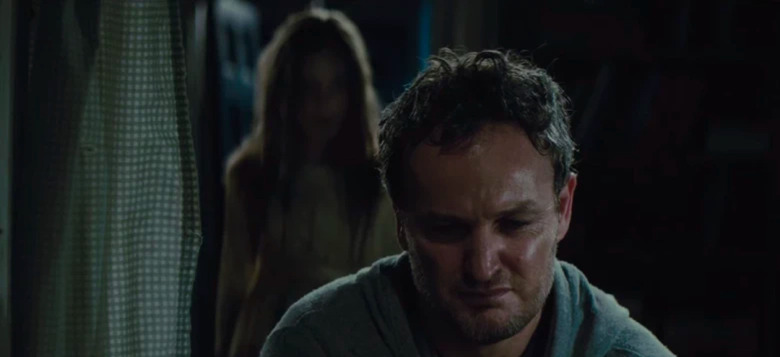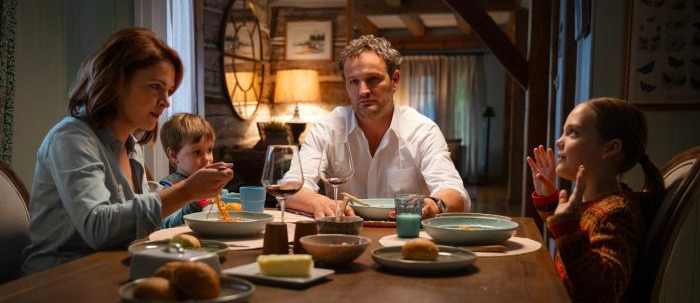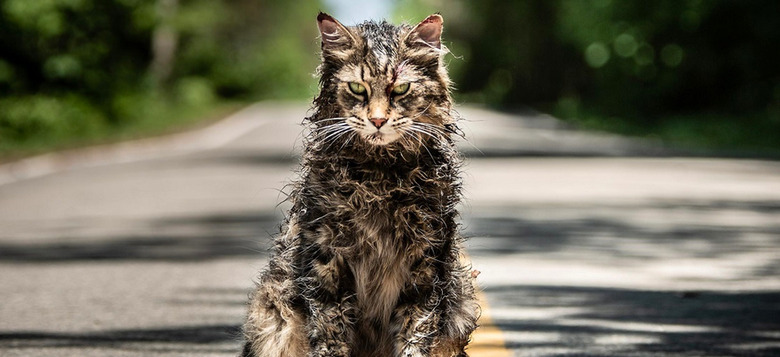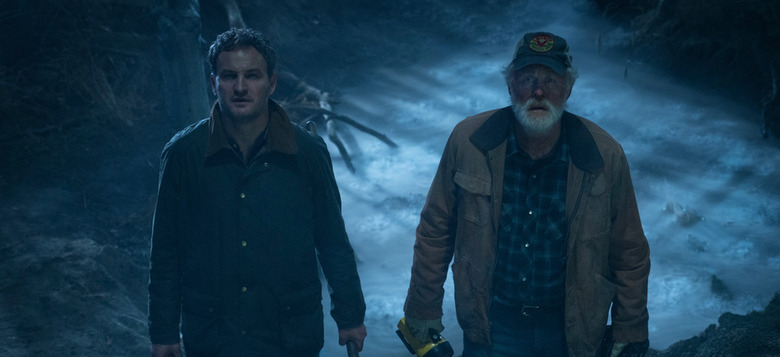'Pet Sematary' Was Frightening Before I Became A Mother – Now I Understand Its Horror All-Too-Well
This post features spoilers for Pet Sematary.
You know you shouldn't, you think that you wouldn't, but what if you could?
When I read Pet Sematary last summer, it was a last minute grab off of the shelf during an otherwise average trip to the bookstore. Unbeknownst to me, I had just grabbed a book so disturbing that it would sink its claws deep into my psyche. Even after reading the foreword, and finding out that King himself originally deemed it too disturbing to publish, I thought myself invincible from any scares it could throw at me. Through a lifetime of horror fandom, I figured I had seen it all.
Pet Sematary offers plenty to be scared of in the typical way that one would expect from a horror story. From warnings delivered from the mouth of a dead man to night terrors, premonitions, and ancient Native American burial grounds, but it wasn't until the following January, when I became a parent, that the story of Pet Sematary's biggest scare sneaked up on me, and grabbed hold with no signs of ever letting go. It manifested a fear in me that no other horror story had ever created. It made me afraid of myself. What would I be willing to do for my child?
Pet Sematary is a twisted blueprint for what a parent is capable of when faced with a level of despair, so unfathomably gut-wrenching, that it has the power to strip away all sanity and logic. There is a dark temptation to Pet Sematary that took several months and two life-changing events for me to fully appreciate.
A Fresh Start
Pet Sematary begins with an all-too-familiar story. The overworked Dr. Louis Creed moves his family to a quaint and quiet home in the country, trading in his long intense hours at the ER for the job of a college campus doctor in order to spend more quality time with his wife and children. Both in the book and on screen, they are your typical loving American family, committed, adoring parents Louis and Rachel, two adorable innocent children, the kind-hearted daughter Ellie and her little brother Gage, and their furry companion Winston Churchill the cat, Church for short. Sure the Creed's, particularly Rachel, have their share of faults and anxieties, but what family doesn't?
Like the Creed's moving to their new country home in Ludlow, Maine, I started reading Pet Sematary at a time when life seemed like it was finally slowing down and falling into place. My husband had recently returned from a long and incredibly stressful overseas deployment, our beloved corgi, Scooby, was happy to see his pack back together again and take his own little break from being my loyal emotional support, and we had just found out that we were expecting our first child. We were basking in the light of our own fresh start, together.
There were so many parallels between us and this family destined for terror, staring me right in the face, but I suppose it is hard to see the obstacles in front of you, when your head is stuck in the clouds. We have faced nothing so tragic as the death of a child, and there were no supernatural forces lurking behind us, but the story of the Creed's and their inherited Pet Sematary haunted me through the coming months, in ways I didn't see coming. I was simply opening a new novel at a time when the all-consuming love that people describe upon seeing their child for the first time were still just words to me, and I was blissfully unaware of the cancer rapidly growing inside my dog as he lay next to me.
Husbands and Fathers
Louis Creed has the composure of a man who has perfected the art of compartmentalization. Separating the horrors that he witnesses in his job, from the loving family he has waiting for him at home, he is able to be a rock for his family when they need him. The intensity of his profession and the training it requires, allows him to handle the issues within his home with a delicacy and stoicism that almost borders on mechanical if you didn't already know how much he loves his family.
The turning point in Pet Sematary, is the untimely death of Church the cat. When Jud shows Louis the body of the run-down animal, Louis is able to calmly stare death in the face and think through what to do. After all, he is familiar with death. He has worked side-by-side with it on a daily basis inside the bleak walls of a hospital, and we already witnessed the grim reaper following him from the ER to the quiet college campus, with the death of Victor Pascow. However, this death is different, because the death of this animal holds more weight than the deaths on his operating table. This death affects his daughter.
On December 15 of last year my dog, Scooby, was taken from me by an aggressive and incurable cancer. I was inconsolable. Through deployments and a history of anxiety, Scooby was more than a pet to me, he was an emotional support animal who got me through many lonely months throughout my marriage, and with his tragic death, my previously healthy pregnancy started to take a turn. The doctor's started to become concerned with my blood pressure, I completely stopped working out, and I couldn't stop crying. I was thoroughly into my third trimester, and while my maternal instinct had yet to kick in, my husband's paternal instinct was already in full swing.
Pet Sematary deals a lot with the primal notions of protection. Particularly in terms of the age old role of a husband/father as the shield of the family, the wall between the horrors of the outside world and the safety of the shelter. It was in these low points of grief over my dog, that I started to think about Pet Sematary again. Louis Creed, a man that I once deemed hugely flawed for his choices, I now saw in a new light through watching my own husband. I began to understand his motives. A stoic man himself, and no stranger to compartmentalizing his own stressful job from his home life, my husband would have done anything to protect my fragile mental state, and ensure the safety of our unborn child.
In lieu of sour ground, my husband bought me a puppy the same breed as Scooby. Like Ellie growing distant towards Church and not really understanding why, I stared at this puppy wondering why he couldn't be Scooby and wishing that things were different. And while I love my new dog now, and I feel guilty for having those thoughts when we first brought him home, I have had months to process the death of my dog. I asked my husband, knowing what he knows about the fate of the Creeds, if he would have buried Scooby in the Pet Sematary. In a heartbeat he said, "absolutely," and I am somewhat ashamed to say that I actually felt thankful that he would have done that for me. Ashamed and disturbed. While I could at least understand the idea of death, and my husband didn't have explain it to me, Louis Creed was faced with piling this level of grief onto his own child, who was still relatively unacquainted with the darker side of life. In the movie it was Jud's grandfatherly love for Ellie that prompts him to take Louis to the cursed grounds, and Louis follows unaware of what the outcome would be. However, like my husband, I don't doubt that Louis and Rachel would both be capable of stomaching the possible grisly results for the sake of sparing Ellie any agony.
A Brief Criticism
I have to pause here briefly for those who have only seen the movie and not read the book, for fear of sounding cruel for wishing for an evil version of a beloved pet to be around your family. While the film adaptations of Pet Sematary play up the idea of evil zombie animals, King describes Church in the book as being dumb and clumsy and smelling of death. There are evil inclinations, but mostly Church is just different. In the book Jud even talks about burying his dog, Spot, in the Pet Sematary only to get back a version of him that just laid around, alive but not really living, until he died (again) of old age. It is a criticism I have with the movie. While the evil undead may play better as a general horror trope, Stephen King takes his time in the novel building up the immense dread and taking a more gothic approach to the undead rather than the flesh eating zombie approach. It is about living with something that is dead, and loving something that scares you.
A Parent’s Love: Turning Horror to Tragedy
Louis Creed's respect for death comes to a screeching halt in front of their once quaint and quiet country home. No matter the version of the story, whether it be the novel or the two film adaptations, the overall outcome is the same: a truck, speeding down the road, takes the life of one of the Creed children. In the book and the 1989 film, it is Gage Creed, the youngest member of the family, that meets his end, but the 2019 film takes a different approach by putting 9-year-old Ellie in death's path. The event sets in motion the demise of Louis Creed and the destruction of his family. Even without the supernatural forces of the burial ground calling to him, every shred of logic and composure that Louis Creed had in him, died with his child, and any bit of sanity that may have been able to help him cope with his loss over time, crumbled the moment he dug up that tiny coffin and carried his lifeless child past the pet sematary, to a disastrous end.
In the novel, Jud gives Louis a warning about the Micmac Burial Ground. He tells the story of a father, grieving over the loss of his son, Timmy Baterman, in the war, burying his body in sour ground. However, unlike the Spot and Church, Timmy didn't return as something clumsy and lethargic, he returns wicked. He is possessed and evil, driving the father to kill his son and then himself. In the 2019 adaptation, however, Louis knows none of this. Perhaps it makes it easier to understand why Louis would think it a good idea to bury his own daughter in the burial ground, after all, Church didn't seem that evil. But honestly, with or without the grim warnings of Jud and the ghost of Victor Pascow, I still understand why Louis Creed did it.
Parental love is a beast of thing. It strikes swiftly and doesn't let go. It is as beautiful as it is terrifying. I didn't feel it right away like all of the pregnancy blogs led me to believe, but about 24 hours after my daughter was born, I woke up, looked over at her, and I cried. People talk about the magical bond between parent and child, but that bond is deeper than joy. It digs itself all the way down to some of your purest animal instincts. "I made you. You are mine. I am going to protect you." Where I was once passive aggressive and non-confrontational, I could already feel that fight building in me that would make me do anything for my child.
I cannot speak for King himself, but now when I think about him tucking Pet Sematary away in a drawer, feeling like he had gone too far, I imagine he felt as I do now: Afraid. Afraid, not of death itself, not of death of your own self, but of the deep dark desperation of a parent wanting to protect their children, of the absolute unimaginable pain of losing not your life, but the life you created and love so infinitely if hurts, and what you could be driven to do for the sake of your children. Pet Sematary is a repulsive, demented, twisted, but brutally honest, depiction of the madness of love.
Pet Sematary poses a question that I am thankful I never actually have to answer. Like Louis Creed, I believe that death is final, no afterlife, no ghosts, no zombies, just you and the ground. Even with the love I now have for my daughter I can, superficially, say that I would never follow in Louis Creed's ill-fated footsteps. But I don't have the option. Thankfully. Where it was once easy to digest the gruesome nature of Pet Sematary as a modern horror classic, I can honestly say that I don't know that I will be able to revisit it anytime soon. Facing the level of despair and depravity as a parent is not something I can consume leisurely, and although I forgive Louis Creed, in spite of the tragedy that befell his family, I never again want to mentally take myself through the those hypothetical steps.
I may know that I shouldn't, and I may think that I wouldn't, but...what if I could?




